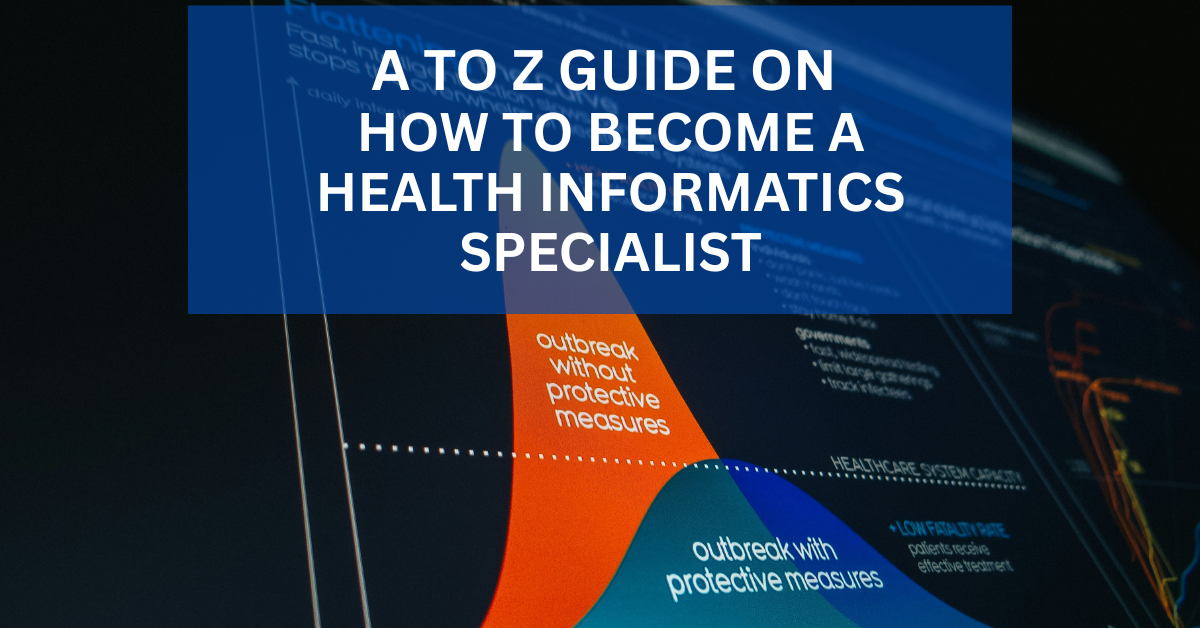The A to Z Guide on How to Become a Health Informatics Specialist

Healthcare management is not limited to doctors, nurses and clinical staff anymore, it has become equally about data management and analysis. With the increasing trend of electronic health records (EHRs), artificial intelligence (AI) in healthcare and stricter regulations such as HIPPA compliance, the need for health informatics professionals who can effectively organize and manage medical data is continuously rising.
The jobs for health information and medical records specialists are expected to grow by a major 11% by the end of 2032, reports U.S. Bureau of Labor Statistics. This growth is primarily driven by the increasing trends of telemedicine, digital health records, and constant demand for secure, compliant patient data systems.
But what does a career in health informatics exactly look like and how can you get started? This guide answers all your queries in detail. Whether you’re a student aiming to land an entry-level position in HIM, a working professional exploring options for specialization or someone considering a degree in healthcare informatics, this blog post has got you covered with all the necessary insights.
Key Takeaways
- Health informatics is a unique field that creates a bridge between technology, healthcare and data – ensuring secure, accurate and actionable patient information.
- There are multiple career paths including entry-level roles such as records technician specialists to the advanced positions of an electronic health record manager, patient information coordinator and coding specialist, etc.
- Certifications such as: RHIT, RHIA, CHDA, CCS, and CPHIMS help enhance the earning potential as well as in career advancement.
- The average salary of a health informatics specialist in the U.S. is around $109,379/annum, with consistent growth guaranteed across global markets.
- The career map in health informatics offers clear progression: entry-level, specialized roles, leadership positions such as: Chief Health Information Officer (CHIO).
- The future of HIM is shaped by big data, AI, and large language models (LLMs) – creating new opportunities for specialists who adapt new technologies.
What Is a Health Information Specialist?
A health information specialist is someone responsible for organizing, securing and analyzing patient data so that it can be used for enhancing healthcare delivery. Unlike clinical staff, their core focus is around the management of health information such as ensuring the medical records are accessible, accurate and compliant with regulations.
Core Responsibilities
Health informatics specialists have the core job responsibility of keeping healthcare providers, patients and technology interconnected. Their roles include:
- Managing health records: keeping all the electronic health records (EHRs) up-to-dated.
- Ensuring Compliance: keeping all the sensitive data secure under HIPPA and other related regulations.
- Data Analysis: interpreting and analyzing both clinical and patient data for billing, research and operational improvements.
- Supporting Healthcare Technology: utilizing systems such as Cerner, Epic, and Meditech to manage the HER workflows.
- Collaboration: working with nurses, doctors, administrators and IT staff to enhance patient care through data.
HIS professionals are critical resources and help ensure that the healthcare data is accurate, accessible and secure enough to improve patient outcomes, says American Health Information Management Association.
How Does a Health Informatics Specialist Differ from a Health Information Manager?
A lot of students confuse the title ‘health information specialist’ with other careers in health data management. Here’s what makes it different:
- Health Information Technician focuses on organizing patient records and codes, most often an entry-level position.
- Clinical Coding Specialist specializes in CPT and ICD-10 coding for billing and insurance.
- Patient Information Coordinator is responsible for managing administrative data such as insurance records and admissions.
- Electronic Health Records Manager oversees the entire HER systems in clinics and hospitals.
- Health Data Analyst uses statistics, data science, and AI tools to determine healthcare trends and support decision-making.
While these roles overlap with each other a lot, a health informatics specialist’s core job is to act as a bridge between healthcare, IT, and compliance teams – making it a much more future-focused and strategic career path than the others.
Why This Role Is Growing
The U.S. healthcare system is investing in digital transformation quite heavily in the form of EHR adoption and AI-driven diagnostics nationwide. IDC Health Insights reports that the healthcare data worldwide is expected to grow at 36% per annum by the end of 2027, meaning all Insurers, hospitals and clinics will require a specialist who can manage the healthcare data efficiently and keep it secure at the same time. With the growing demand, careers in healthcare information management, specifically in analytics and informatics are rapidly expanding – creating strong job security and advancement opportunities for the graduates in this field.
Five Steps to Becoming a Health Informatics SpecialistTo become a health informatics specialist, you aren’t just limited to securing a degree, instead, it’s a structured journey that blends education, certifications, continuous learning and hands-on experience. Here’s a step-by-step, detailed career mapping that will help you transition from the entry level roles into an advanced health informatics specialist position such as, a Health Data Analyst, Electronic Health Records Manager, etc. Step 1 Earn a Relevant DegreeThe foremost step is education. Most HIM careers require you to have at least an associate degree, but they increasingly prioritize a bachelor’s degree in health information management or health informatics. Associate’s Degree in HIM
Bachelor’s Degree in HIM or Informatics
If your goal is to land a promising career with a degree in health information management, a health informatics specialist position is certainly your pathway to higher income and leadership. Step 2 Obtain Certifications for Career AdvancementCertifications play a critical role in career advancements, especially for the HIM graduates. They can validate your expertise and make you stand out in front of employers. The most worthy and recognized certifications in HIM are offered by HIMSS and AHIMA.
Step 3 Gain Practical ExperienceWhat you learn in a classroom is only half of the journey. Employers expect a lot more than those theories, they want you to bring along hands-on experience with the healthcare data systems.
An average 75% of healthcare employers prioritize candidates with clinical data experience for a mid-level informatics role, suggests HIMMs. Step 4 Move Into SpecializationNow that you’ve gained enough education and gathered relevant practical experience and certifications, the next step is to pick a specialization path or move towards a health informatics leadership position. This is where you can start shaping your professional identity and grow towards high-income, impactful roles. Choose a Path for Specialization There are multiple areas you can choose from on the basis of your interests and exposure. They include:
Step 5 Pursue Continuous EducationHealthcare technology is evolving every other day and so is the need for HIM professionals. If you really want to land a promising career in this field, stay ahead of trends.
Continuous learning can ensure you stay competitive and on top of your field. It can help you quickly adapt to how AI, machine learning and LLMs (large language models) are transforming the way patient data used to be collected, analyzed and implemented. |
Career in Health Informatics Progression
The career landscape is continuously expanding for health informatics professionals. With healthcare organizations depending more and more over EHR optimization, AI integration and data-driven decision-making, the need for those who’re well-versed with both healthcare and technology is massive. Unlike traditional HIM roles that were mainly focused around record-keeping only, health informatics careers emphasize the unbiased intersection of technology, data and patient outcomes.
Entry-Level Informatics Roles
If you’re only starting out in this field, entry-level roles can offer a solid foundation:
- Health Information Technician (with informatics training): the role requires using EHR systems and ensuring all the digital health records are being accurately maintained.
- Clinical Data Coordinator: the role is responsible for collecting and validating patient data and utilizing that in reporting and analytics.
- Patient Information Coordinator: they are responsible for creating a bridge between administrative processes and the digital health systems so that smooth entry and retrieval of data can be ensured.
These roles often prove to be the stepping stones for an advanced and more technical career as you gain experience and certifications over the period.
Mid-Level Careers in Health Informatics
With a combination of a bachelor’s degree in health informatics or information management and certifications like RHIA, you can easily move towards the mid-level specialized roles, including:
- Health Data Analyst – This role requires using statistical methods, AI-driven analytics and SQL to extract-out insights from patient records. A health data analyst typically interprets HER data to help enhance efficiency and quality of care as well as manage costs.
- Clinical Informatics Specialist – They work closely with clinicians to help optimize the HER workflows, implement latest IT tools that support healthcare processes, as well as enhance patient safety.
- EHR Manager/ Systems Analyst – they are responsible for overseeing the functionality, security and integration of HER platforms implemented across hospitals.
The average income of a health data analyst is around $100,423/annum while Clinical Informatics Specialists make up to $111,262/year. These salaries, however, are subject to your experience and knowledge around the field.
Advanced and Leadership Roles
If you’re a professional with extensive expertise in health informatics and carry advanced degrees in combination with valuable certifications, there are multiple opportunities in leadership and strategy to pursue:
- Health Informatics Manager/Director – the role involves overseeing teams that manage HER systems, compliance and data governance. They typically lead teams implementing analytics platforms, EHRs and AI-driven systems across the healthcare networks.
- Chief Medical Information Officer – this is a senior-level, executive role that focuses on aligning health IT strategies with patient care delivery to improve outcomes.
- Population Health Analyst – they are responsible to leverage informatics skillset in studying large datasets for determining public health trends, disparities and preventive care opportunities.
- Clinical Data Manager – They are responsible for leading clinical trials related to data collection, analysis and integration.
- Health Information Administrator – they are responsible for overseeing data governance, compliance, and technology adoption in health information systems.
- Healthcare Data Scientist – the role involves leveraging machine learning and AI in the extraction of valuable insights from widespread healthcare datasets.
The leadership roles in informatics often exceed $200,000/year, especially when combined with advanced-level certifications like CPHIMS.
Fast-Growing Niches in Health Informatics
The future of informatics is correlated with the emerging technologies and modern healthcare models. Some of the fastest growing specializations include:
- AI & Predictive Analytics in Healthcare – Leveraging machine learning and LLMs to predict patient outcomes and resource needs.
- Telehealth Informatics – Managing data integration across the different virtual care platforms.
- Clinical Decision Support Systems (CDSS) – designing tools that help doctors take evidence-based decisions about treatments.
- Healthcare Cybersecurity and Data Privacy – keeping the sensitive EHR data secure against any cyber threats and breaches.
These areas make health informatics one of the most future-proof healthcare careers, offering job security and upward mobility.
What Key Skills Do Health Informatics Specialist Require
Healthcare informatics is a unique field that combines data analytics, healthcare knowledge and technology skills. If you want to succeed and land a promising career in this field, it is important that you are comfortable about navigating coding standards, HER systems and AI-driven analytics, while also effectively communicating with administrators and clinicians.
The most popular and in-demand skills in health informatics fall into three categories i.e. soft skills, technical expertise and emerging tech capabilities, highlights the Healthcare Information and Management Systems Society (HIMSS).
Technical Skills
The core skills every informatics professional must master includes:
- Electronic Health Records (EHR): proficiency in systems like Meditech, Cerner and Epic.
- Health Data Standards: a thorough understanding of CPT coding, ICD-10, HL7 and FHIR (Fast Healthcare Interoperability Resources) for data exchange.
- Database Management and SQL – know how to use a large volume of structured/unstructured healthcare data.
- Data Analytics and Visualization – knowledge around using Power BI, Tableau, or Python libraries for analyzing patient trends.
- Healthcare Regulations and Compliance – make sure the data meets all HIPPA and CMS requirements.
Soft Skills
Health informatics sits at the crossover of IT, healthcare and administration, making soft skills a critical requirement of technical expertise. The core soft skills to master include:
- Communication – converting complex data insights into actionable recommendations for executives and doctors.
- Collaboration – working closely with cross-functional teams such as IT staff, clinicians and administrators.
- Attention-to-detail – to make sure the records are free from any errors or complaints.
- Problem-Solving – to address any inefficiencies in the workflow and design solutions within the EHR systems.
HIM professionals who combine theory technical skills with skills as of leadership and communication are 50% more likely to land management roles, reports AHIMA.
What Type of Certifications Do You Need
Certified health informatics specialists earn 8-12% more than those without a certification. The most popular and recognized certifications include:
RHIA (Registered Health Information Administrator)
Issued by AHIMA, RHIA certification is great for those pursuing management roles in HIM, compliance and data governance. It is often a compulsory requirement for direct-level HIM positions.
RHIT (Registered Health Information Technician)
Issued by AHIMA, this certificate helps landing entry to mid-level positions in the field of health informatics. It mainly focuses around managing patient records and ensuring coding support as well as EHR data quality. The certification can serve as a strong entry point for professionals aiming to land roles as EHR specialists or data analysts.
CSS (Certified Coding Specialist)
Also issued by AHIMA, CCS is an ideal certification for coding specialists. It can help you gain expertise in HCPCS, CPT, and ICD-10-CM for hospital reporting and insurance companies. Gaining CCS can maximize your employability in hospitals, insurers and billing companies.
CPHIMS (Certified Professional in Healthcare Information and Management Systems)
Issued by HIMMS, this certification is ideal for IT and informatics professionals. Its main focus is around health IT, analytics, system integration and leadership. The certificate is globally recognized as a mark of excellence in health informatics leadership, meaning great career opportunities.
CHDA (Certified Health Data Analyst)
Issued by AHIMA, this certificate is ideal for researchers, data analysts and population health specialists. With a core focus towards data governance, advanced analytics and bid data techniques in healthcare, it can prepare you for roles that involve AI-driven health data and predictive analytics in care delivery.
Why Certifications Matter
Certifications are important for health informatics professionals for multiple reasons. It helps build credibility for most of them are validated by HIMSS/AHIMA. If you want to be eligible for senior-level or specialized roles, then this is one of the important criteria for selection. In your capacity as a senior level manager, skills developed from certifications help you handle FHIR, HIPPA, ICD-10 and EHR compliance with confidence.
Moreover, professionals that come along with a certificate earn 10-20% more on average. With high demand for health informatics specialists in the industry, certifications of CPHIMS and CHDA prepare professionals for AI and data-driven healthcare systems.
Choosing the Right Certification
However, getting any certification is not the best route or smart way to go about developing your career. Consider these aspects.
- If you want to lead HIM departments → RHIA.
- If you’re starting out in EHR and records management → RHIT.
- If you want to specialize in coding & billing → CCS.
- If you’re aiming for informatics leadership & IT strategy → CPHIMS.
- If you’re moving into data analytics & AI healthcare roles → CHDA.
How Much Does a Health Informatics Specialist Earn?
Pursuing a career in health informatics is not only future-proof but also high-income and financially rewarding. With the rapid digitization of healthcare systems, the demand for skilled professionals who can effectively manage, secure and analyze patient data is growing.
The average salaries of the popular roles in health informatics can be listed as follows:
- Health Information Manager – $100,646/annum
- Health Data Analyst – 100,423/year
- Clinical Coding Specialist – $61,068/year
- Electronic Health Records Manager – $105,943/annum
- Patient Information Coordinator/Records Technician Specialist – $465,183/annum
Conclusion
Pursuing a career as a health informatics specialist can prove to be the smartest move for students or professionals who are well-versed with the intersection of technology, healthcare and data-driven decision-making. With healthcare systems heavily relying on electronic health records, AI-driven tools and predictive analytics – the demand for skilled health informatics professionals is on the continuous rise.
Whether you’re only starting out with entry-level roles such as a patient information coordinator or a records technician specialist or aiming to land an advanced position like health data analyst, clinical coding specialist or electronic records manager, the opportunities are massive. Moreover, adding a certification can significantly maximize your earning potential.
The widespread career opportunities and high-end salaries reflect the growing recognition of the professional. Specifically, given that the future of this field lies in the integration of machine learning, AI and large language models – Health Informatics professionals have become central to the innovations and how they’ll shape the future of healthcare.



